
John Bonini
Marketing Director, @bonini84
As the Marketing Director at IMPACT Branding & Design, John oversees the company’s entire lead generation and branding strategy, utilizing blogging, premium content creation, social media marketing, search engine optimization and video marketing in order to help grow the company and expand its reach.
Under John’s direction, IMPACT has experienced significant growth in its blog subscribers, social media following, as well the company’s overall traffic and lead generation.
In addition to his work at IMPACT, John has also been interviewed and featured in several industry leading publications, including the Wall Street Journal’s SmartMoney, MarketWatch, as well as the HubSpot blog.
Contents
*Much of the data you'll see here was collected from HubSpot's State of Inbound Marketing 2013 report unless otherwise noted.
Inbound Marketing is no longer a convenient add-on or experimental area for companies. It is required method of doing business in today's consumer-focused world.
 Jason Falls
Jason Falls
Founder Social Media Exlporer
New technologies will continue to grow, but the best marketers will realize it's not about how to jam more ads into new platforms – it's about how to use the new technologies to enhance your inbound powers of attraction.
 Dharmesh Shah
Dharmesh Shah
CTO and Co-Founder of HubSpot
If you wait until there is another case study in your industry, you will be too late.
 Seth Godin
Seth Godin
Best-Selling author of Purple Cow
People shop and learn in a whole new way compared to just a few years ago, so marketers need to adapt or risk extinction
 Brian Halligan
Brian Halligan
CEO and CO-Founder of HubSpot
“You have to spend money to make money” is a familiar adage many businesses adhere to.
While this is still true to a degree, Inbound Marketing has effectively turned this theory on its head.
Whereas the traditional marketing activities that worked in the past required more budget to actually see results, with Inbound Marketing, you can actually spend less money and experience even greater results.
According to HubSpot, Inbound Marketing delivers a cost per lead 61% cheaper than traditional marketing. Talk about ROI.
But let’s stop right there. Too many times, we’re fed handsome statistics and data and expected to go along for the ride.
The question businesses want answered isn’t “does it deliver an ROI?” but rather, “how does it prove an ROI?”
That’s what we’ve aimed to do here. Prove the value of
Inbound Marketing by highlighting the most important
aspects of a successful campaign, and how they impact
your bottom line.
We’ve collected the newest data from the most trusted
of industry sources in order to provide you the clearest
picture of what to expect from Inbound Marketing.
No fairytales.
Just the facts.
The Culture Shift
Before we can understand the why? and how? related to the ROI of Inbound Marketing, we first must understand why Inbound?
What does it mean? And more importantly, why does it work?
The idea behind Inbound Marketing is simple; as technology changes, so does the way in which people behave and communicate with one another. Our lives are meant to get easier. We’re more connected. More informed.
We have access to pretty much anything we want...wherever and whenever we want it. Everything and everyone is connected and integrated in such a way that it’s only natural we’ve altered our behavior as it relates to such simple things as watching TV, answering the phone and reading books.
Technology has drastically changed the way we work and live.
Most importantly, it’s changed the way in which we come to buying decisions.
We’ve become reliant on the screen. Smartphones, tablets and laptops have replaced the cash register as the preferred method of buying. It’s for this reason that billboards, print ads, direct mail and cold calling simply don’t work anymore.
Below is a graph published by eMarketer on the current revenue generated from e-commerce as well as the projected revenue in the years to come.
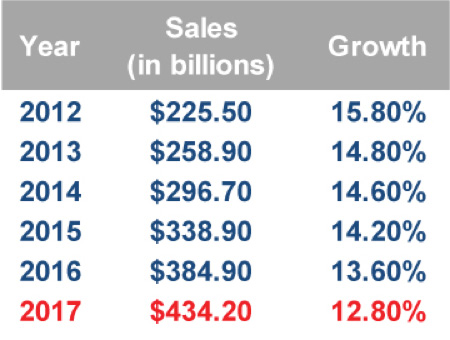
Inbound is right now. It’s not coming soon. It’s not down the road.
It’s the manner in which consumers are behaving. Right now.
But these are only words. Our mission here is to prove what we already know to be true; in order to succeed in business moving forward, we all need to go Inbound.

Cost of Outbound vs. Inbound
Marketing budgets are being wasted.
Print ad space. TV commercials. Distribution costs.
We’re much too smart to still be relying on marketing tactics that simply have lost effectiveness.
Traditional marketing has been the norm for so long. Print ads. TV and radio commercials. Billboards. Naturally, marketers and business owners still turn to these “tried-and-true” methods for results. However, with the dawn of the Internet and mobile generation, it is no longer as effective or cost efficient.
The average cost for one outbound marketing lead is around $332 compared to the significantly lower $134 cost of an inbound lead.
That’s more than double the cost.
Aside from being more cost efficient, Inbound Marketing also proved to be more effective in generating leads in 2013 according to the State of Inbound Marketing Report published by HubSpot. (See chart below)
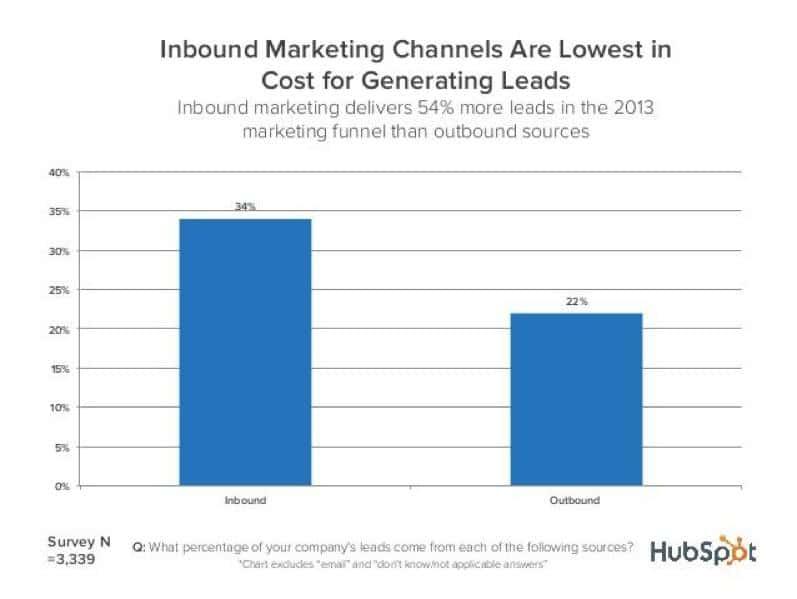
What do these numbers tell us? Well...not only is Outbound costing you more in dollars spent, but it’s also costing you in potential dollars earned. Not your ideal model for growth and sustainability.
The reason is pretty simple; Inbound Marketing aligns more effectively with the behaviors of the modern consumer. Mass media is broken. Consumers are too smart for it and, with the advent of modern technologies, are now equipped to skip out and ignore your marketing message very easily.
This is why appealing to the consumer on their time and in the places they hang out is critically important.
And as proven in the data below, the best part about Inbound is that, because of how social and connected technology has allowed us to be, it’s also much easier and effective to carry out an Inbound strategy than it would be to continue on your current track using traditional methods.
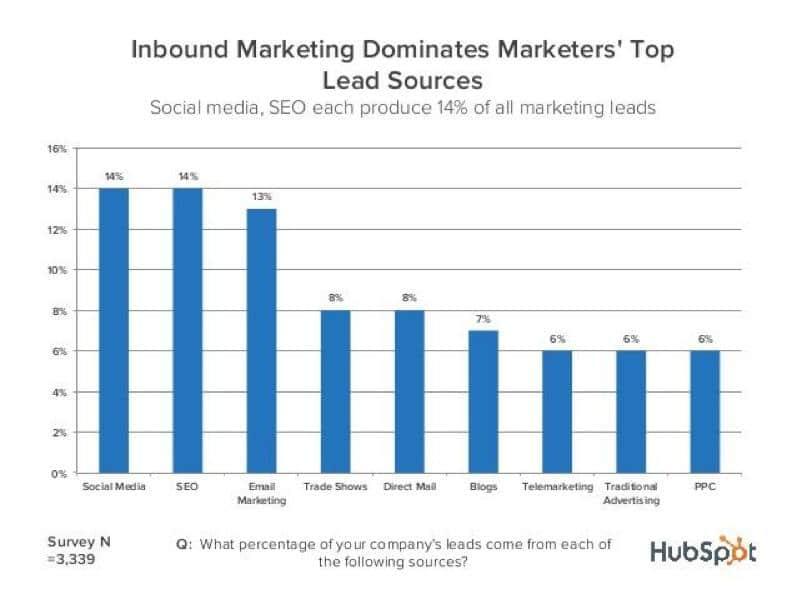
Inbound Marketing Best Practices:
Proving the ROI
Content
In the past, content marketing meant something you could hold or see on the side of the Interstate.
 But here’s the problem, increasingly more people are digesting news on their smartphones rather than the newspaper. They’re not even looking at billboards. (Sadly, because of text messaging, many may not even be looking at the road.)
But here’s the problem, increasingly more people are digesting news on their smartphones rather than the newspaper. They’re not even looking at billboards. (Sadly, because of text messaging, many may not even be looking at the road.)
Print and television ads were your grandparents’ content marketing.
These days, blogging, interacting on social media and providing useful information are the best ways to engage consumers.
It’s about building relationships.
It’s about being the resource your prospects are looking for to assist in their buying process. It’s for this reason that blogs and premium content have become an integral part of any successful marketing campaign.
Consumers are no longer looking to be interrupted (see below).
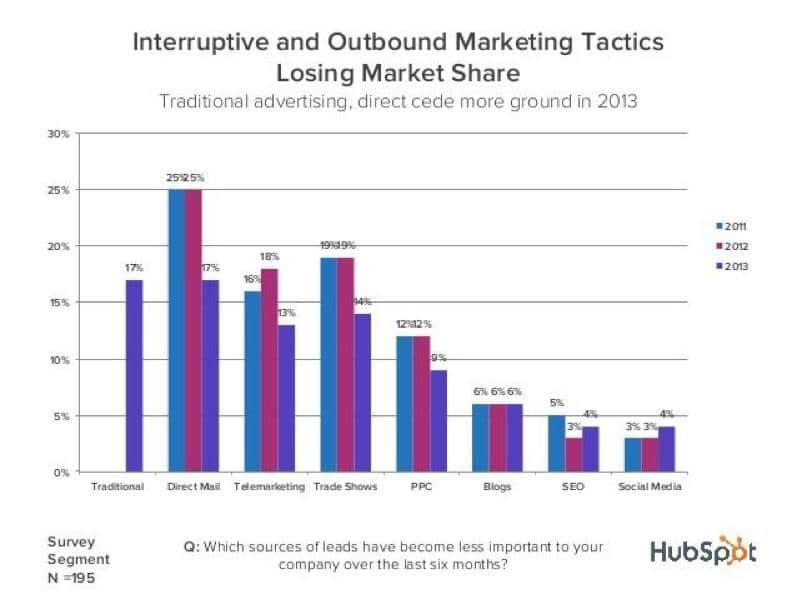
Customers will find you...if you’re providing the resourceful information they’re looking for. Companies who recognize this trend are the same ones seeing results.
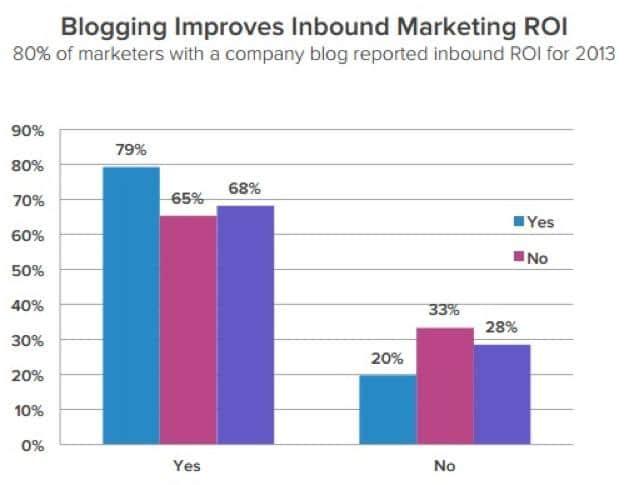
Search engine optimization used to mean stuffing your website with industry related keywords in the hopes your prospects would find you in their search queries.
Then, smartphones and tablets happened. Consumers now had access to information whenever they wanted. Anywhere. A significant shift happened during this time, as businesses start employing blogs and content strategies in order to cater to this “information overload” generation.
Now content is everywhere. Google knows this. Which is why keywords don’t matter so much anymore as the quality and consistency of the content you’re distributing.
As you can see from the chart below, consistent blogging improves overall ROI, typically improving with the frequency in which you publish.
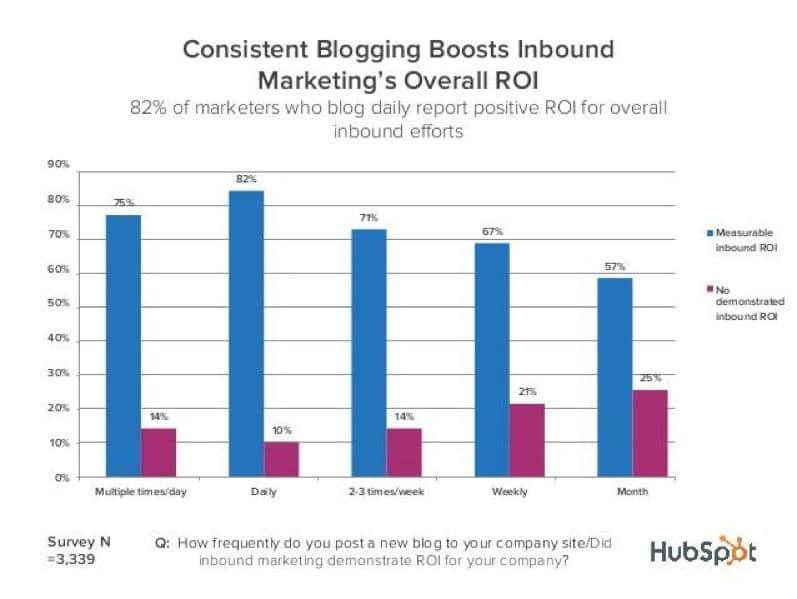
Content is the new SEO. Not will be the next big thing. It’s here. Right now. And it’s critically important.
Most importantly, it works.
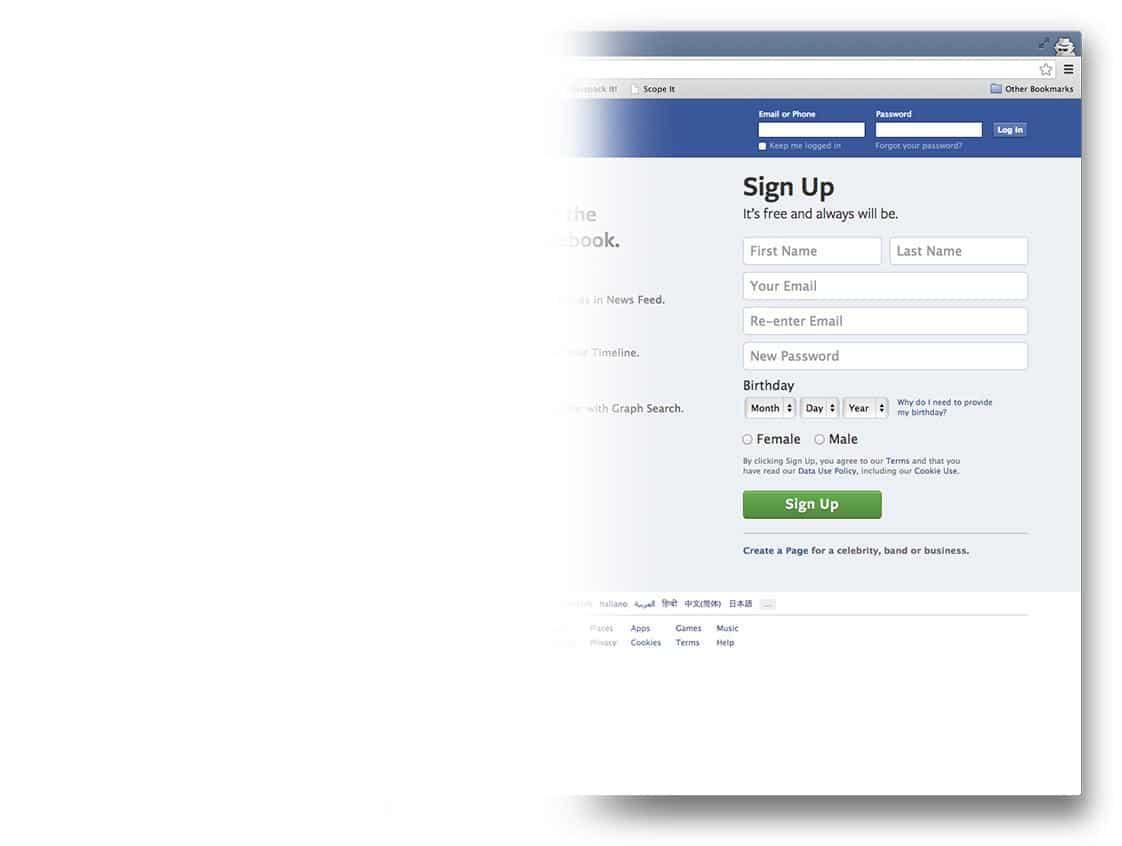
Social Media
When it comes to cost per lead and acquisition, nothing provides value quite like social media marketing.
There’s simply no other place where marketers and business owners have such limitless access to members of their target audience...for free!
Word of mouth marketing has always been the most powerful form of advertising. And with the addition of social media as a marketing initiative, businesses have the ability to put that word of mouth marketing on steroids, as one happy customer could mean 100 more.
According to a study by Syncapse on the value of a Facebook fan, “85% of fans of brands on Facebook recommend brands to others, compared to 60% of average users.”
The beauty of it all is that while extremely effective at targeting your ideal customers, it’s also one of the cheapest methods for doing so.
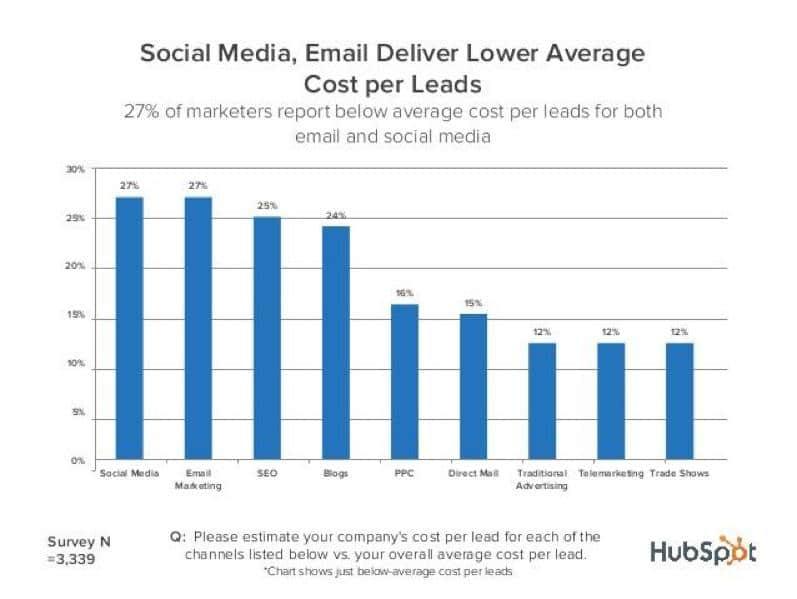
Leads are great. A lower cost per lead is even better. However, none of this really matters unless it translates into business, right?
The question so many business owners want to know is, “is social media actually going to result in customer acquisition?”
One HubSpot study calculated the percentage of companies with a social media presence that have obtained a customer through social media. 67% of B2C companies with a Facebook business page have acquired a customer through their Facebook page.
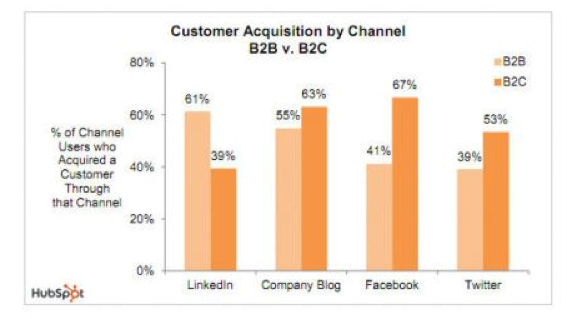
This Facebook figure was the highest customer conversion percentage, followed by a 53% conversion from Twitter and a 39% conversion from LinkedIn. LinkedIn was the most successful site for obtaining B2B customers at 61%. Clearly a strong social media presence is an easy way to grow your customer base.
How about when compared to other common marketing methods used to generate customers?
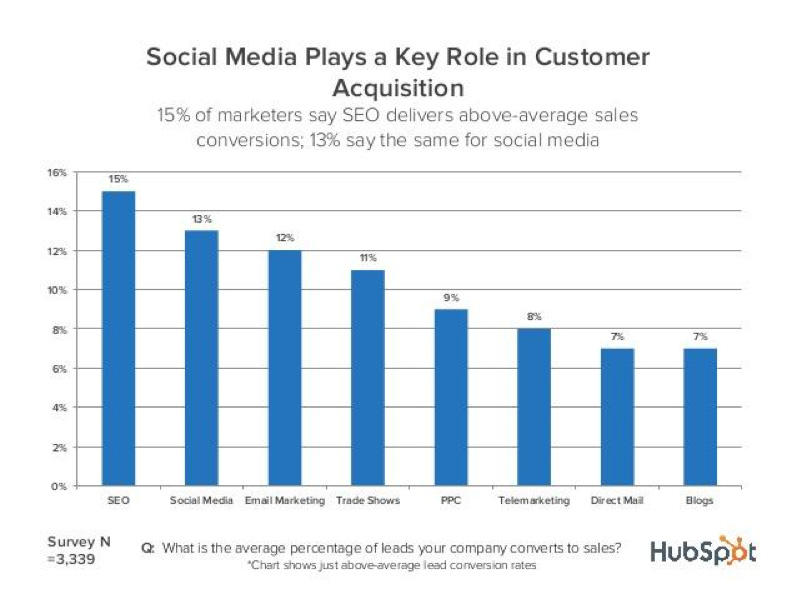
Social Media Marketing is not a luxury for businesses who simply have the time for it. It’s a necessity for any business or marketer that’s functioning in the 21st Century “Connection Economy.”
That means you.
It’s no longer a matter of “does it prove ROI?” It does.
It’s about developing a strategy that works for your company.
Email
Businesses still using direct mail as a method of customer acquisition are basically paying to end up in someone’s trash bin.
According to HubSpot, 44% of direct mail is never even opened.
And while it’s still effective in some industries, distribution costs render the ROI minimal, particularly when compared to Email Marketing.
Below is a chart detailing the total spent on the various channels in 2012.

Due to the expense of Direct Mail, Email is the clear winner in terms of return on investment. (See below.)

Email marketing is the clear winner in terms of ROI. Similar in revenue, utilizing email marketing over direct mail allows you to reallocate resources to other marketing initiatives in order to strengthen your overall campaign.
However, before you go hiring someone whose sole purpose is to hit the send button all day, know that email marketing is much different under the umbrella of Inbound Marketing than what you’re probably used to.
It’s all about proving context. Think about how many emails you receive (and ignore) from brands throughout any given work week. The reason for this is because marketers have ruined it for everyone.
Which is why we needed a new approach. We needed to be more human. Inbound Marketing utilizes list segmentation tools in order to deliver a more targeted message to each email recipient, ensuring increased engagement, as well as a greater likelihood to buy.
As you can see from the graph below, sending segmented emails significantly improves just about every metric as it relates to the success of your email marketing campaigns.
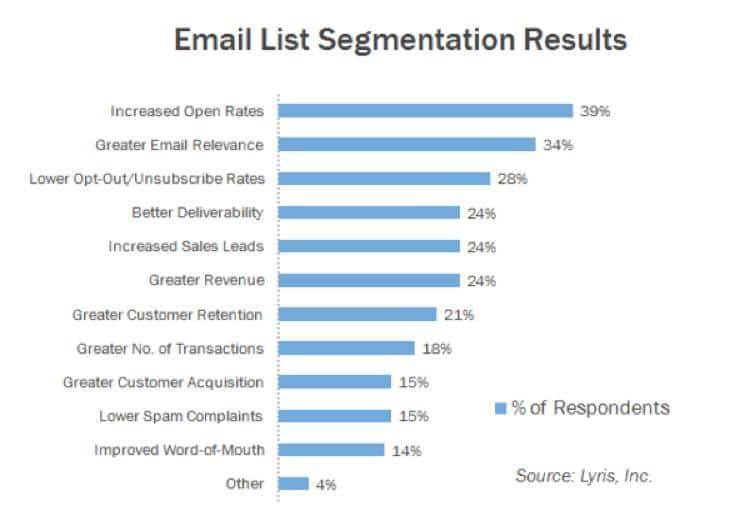
In addition, HubSpot concluded in their own research that targeted and segmented lead nurturing emails generate an 8% click-through rate compared to general email sends, which generate just a 3% click-through rate.
Moral of the story? Email Marketing delivers an ROI far greater than any print collateral you plan on distributing. More importantly, it has the potential to be far more personal and targeted, which in turn, ensures optimal results.
Conclusion
Inbound Marketing often has an idealistic tonality in its approach and presentation.
However, let’s not get confused. Inbound Marketing hasn’t grown to be as expansive as it is because it sounds good or seems like the “right thing to do.”
No. It’s grown to become the movement it has because of one reason alone. It works.
No empty promises or fluff.
And it can work for you.
Turn these tips into Actual Results
How Can You Improve Your Inbound Marketing and Achieve Your Business Goals?
In your free assessment, you'll receive:
- A 30 minute conversation with an inbound marketing consultant.
- An evaluation your current website and marketing strategy.
- Suggestions for improvement.
- Ideas on how to measure the return on your marketing investment.
- Real solutions to achieve your business and marketing goals.
This is not a sales call and you'll have no-obligation to buy anything. If after the assessment you feel IMPACT can help you achieve your marketing goals, we'll schedule a second call to start developing your inbound marketing strategy.
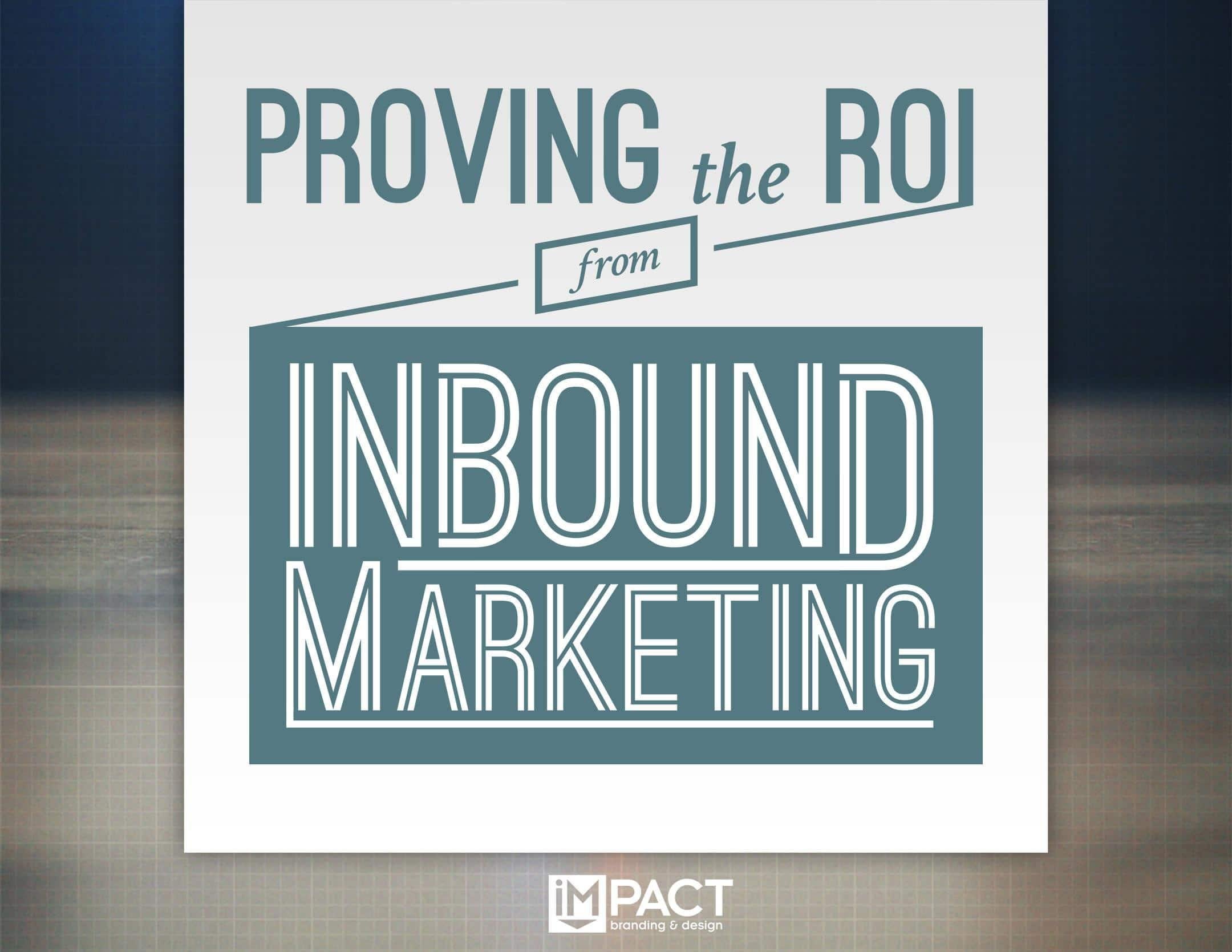

 Jason Falls
Jason Falls Dharmesh Shah
Dharmesh Shah Seth Godin
Seth Godin Brian Halligan
Brian Halligan



 But here’s the problem, increasingly more people are digesting news on their smartphones rather than the newspaper. They’re not even looking at billboards. (Sadly, because of text messaging, many may not even be looking at the road.)
But here’s the problem, increasingly more people are digesting news on their smartphones rather than the newspaper. They’re not even looking at billboards. (Sadly, because of text messaging, many may not even be looking at the road.)








